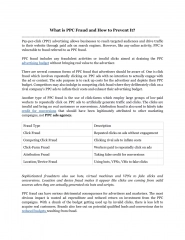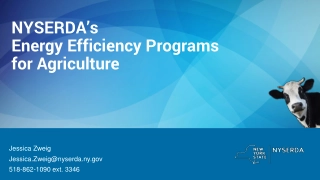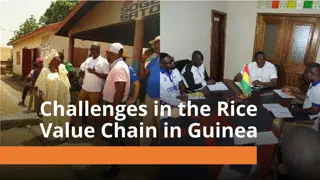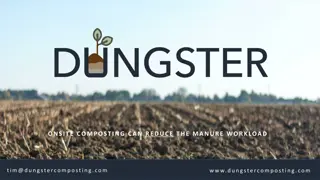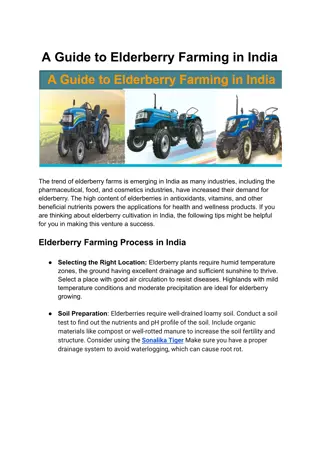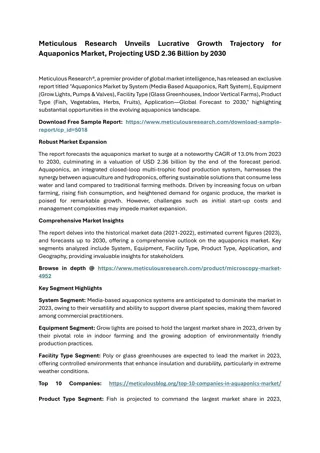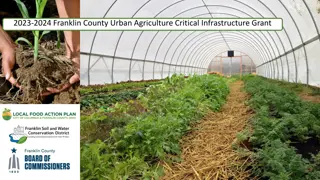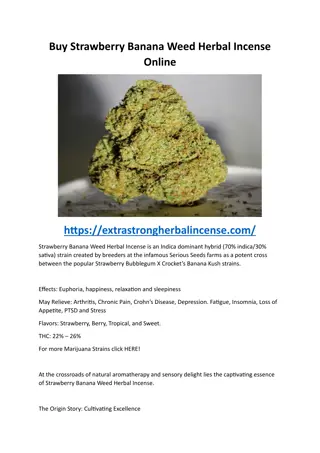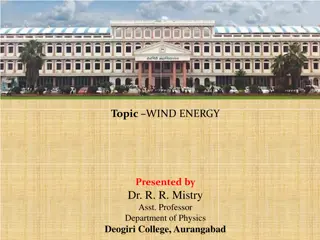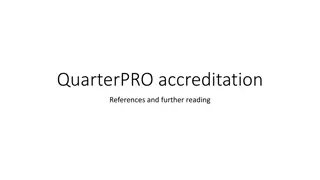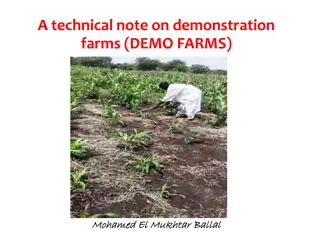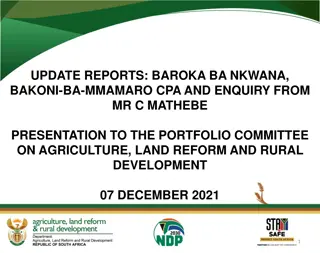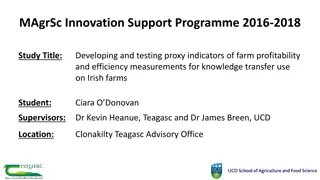
Advancing Sustainable Agriculture Through FARMS Program
The FARMS program, initiated under the 2018 Farm Bill, focuses on promoting regenerative management systems in agriculture. With a strong emphasis on soil health, the program supports farmers in adopting practices that benefit both the land and their profitability. Through financial incentives, social support activities, and comprehensive evaluations, FARMS aims to facilitate the transition to sustainable production systems. The program evaluates soil health parameters and compares fields under different management practices to measure the impact of regenerative farming techniques.
Download Presentation

Please find below an Image/Link to download the presentation.
The content on the website is provided AS IS for your information and personal use only. It may not be sold, licensed, or shared on other websites without obtaining consent from the author. If you encounter any issues during the download, it is possible that the publisher has removed the file from their server.
You are allowed to download the files provided on this website for personal or commercial use, subject to the condition that they are used lawfully. All files are the property of their respective owners.
The content on the website is provided AS IS for your information and personal use only. It may not be sold, licensed, or shared on other websites without obtaining consent from the author.
E N D
Presentation Transcript
FARMS: Background 2018 Farm Bill $25 million for the CIG On-Farm Trials $10 million for the Soil Health Demonstrations The objective of Soil Health Demonstration Trials is to identify, document, and evaluate regionally successful approaches to, and outcomes of, adapting practices for transitioning to and adopting full SHMS in varied production systems. Project Partners CCTA, Health First, CSU, KSU Proposal submitted in July 2019
FARMS: Background November 26, 2019 NRCS announced application was successful $1.6 million awarded to FARMS Total project estimate $2.1 million over 3 year period February 2020 Finalizing grant agreement paperwork Currently accepting applications into the program
FARMS: Philosophy & Values FARMS: Farmers Advancing Regenerative Management Systems Farmer-led, benefits the producer long-term Advances the soil health management system with new techniques Regenerates both the land and farmer profitability Management is based on each producer s context and climate Systems-approach is emphasized more than individual practices
FARMS: Project Objectives Objective 1: Financial Support Incentive payments to create Comprehensive Soil Health Management Plans Acre-based payment for implemented practices Objective 2: Social Support Peer mentoring network Soil health round tables, field days, other events Objective 3: Evaluation Soil health and nutritional density Economic burdens, advantages, and market opportunities Social impacts
FARMS: Soil Health Evaluation Details Comprehensive soil health evaluation Performed by CSU (Dr Schipanski) and KSU (Dr Obour) Samples collected in early summer in Year 1 and Year 3 Covers wind erosion potential, soil moisture sensors, bulk density, water- stable aggregates, infiltration rates, soil organic carbon, pH, nitrogen, phosphorus, microbial activity, and fungal to bacterial ratio. Side-by-side trials of FARMS fields vs. nearby conventional fields We ll be able to compare different FARMS fields to each other with a soil health intensity score When a producer does more regenerative practices more intensely and for a longer time = higher score
FARMS: Economic Evaluation Details In-depth economic evaluation Covers 2014-2023 on FARMS fields Your individual data is held private. Only aggregated and anonymized data is given to people beyond the FARMS project staff All management data Yields, inputs and their costs per acre Equipment used Sales prices of crops Want to understand relationship between profit and soil health intensity score, inputs use, and soil health metrics
FARMS: Consumer Willingness-to-Pay Are consumers willing to pay for Regenerative products? Or Nutrient- Dense products? If yes, what markup could we expect? We ll work with CSU s Agricultural and Resource Economics department (Dr Jablonski and Dr Costanigro) The Redwood Group (Venango, NE) and Ardent Mills (Denver, CO) will partner with us on this study as well We ll design an experiment to evaluate consumers willingness to pay based on assorted logos and messaging, and how that changes based on context (farmer s market vs grocery store). Regenerative Nutrient dense (based on results from that study)
FARMS: Social Evaluation Details Understand social impacts of soil health management We ll work with CSU s Institute for Research in the Social Sciences (IRISS) Create evaluation logic model to measure program effectiveness regarding: Mitigating barriers to adoption of soil health management Risk management, program rigidity Providing social support Improving participant well-being Networking with other producers Proactive decision making for soil health/profitability Gather information through conversations with producers
FARMS: Nutrient Density Background Are crops grown on healthy soil more nutrient-dense? The mineral content in grains, vegetables, and fruits has been diminishing in recent decades Most research in this field focuses on adding micronutrients to fertilizers or genetically modifying plants to uptake more minerals We need to understand if a healthy and diverse on-farm ecosystem can restore nutrient density in grain: can soils rich in mycorrhizal fungi deliver more nutrients to the plant? FARMS will measure the density of these micronutrients in small grains, and compare the results for healthy soil vs. neighboring conventional operations.
FARMS: Nutrient Density Details Are crops grown on healthy soil more nutrient-dense? Collect small grains and pulses during harvest from the long-term practitioners fields Measure for total protein and mineral nutrients (Na, Mg, Al, Si, P, S, Cl, K, Ca, Cr, Mn, Fe, Co, Cu, and Zn) Compare to neighboring conventional farms
FARMS: Incentive Payments Comprehensive Soil Health Management Plan $2500 to create it in year 1, $1500 year 2 review and revise, $1000 year 3 review Soil Health Practice Implementation $10,000 max payment per producer per year for 3 years Based on NRCS program payments
FARMS: Eligibility Requirements Are you eligible? EQIP eligible In compliance with the Highly Erodible Land and Wetland conservation provisions Producer located in Eastern CO, KS, or NE Have control of the land involved for the next 3 years Meet the adjusted gross income requirements Are you also enrolled in EQIP? FARMS does not count toward EQIP payment limitation Double payments are not allowed Extra Priority Elements Beginning, Veteran, Limited Resource, Socially Disadvantaged Specifically addressing these national NRCS priorities: cover crop selection and establishment challenges, and opportunities for interseeding, intercropping, and living mulches opportunities to integrate greater diversity in production systems, such as management for soil health in integrated crop-livestock systems cover crop termination in organic or herbicide resistant systems for insurance purposes soil health in cold climates soil health alternatives to chem fallow
FARMS: Supporting Partners Thank you to all our supporting partners and their contributions to this project!
Additional Information Website www.farmsproject.org Administrative Contacts Joni Mitchek, FARMS Project Manager coordinator@highplainsnotill.com 719-892-0379 Becky Ravenkamp, FARMS Nutrition and Committee Coordinator becky@trusthealthfirst.org 719-740-0715 Lauren Hafford, FARMS Evaluation Coordinator lauren.hafford@gmail.com 970-231-2015

